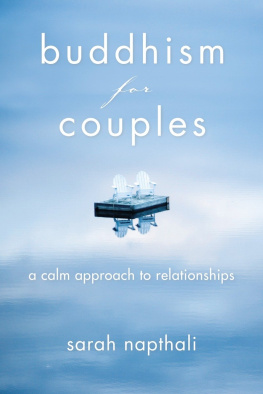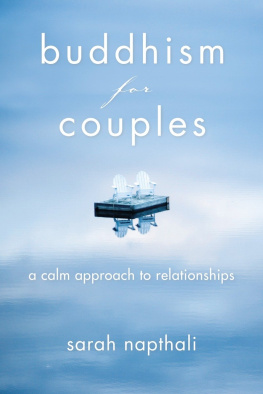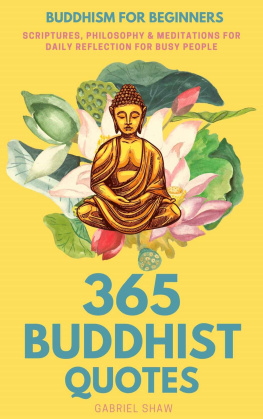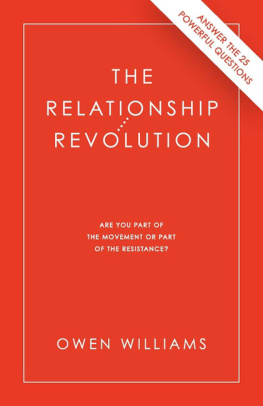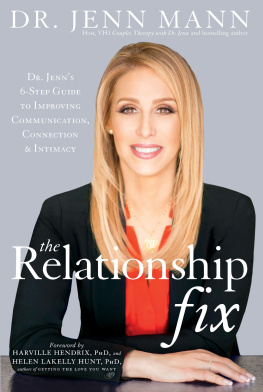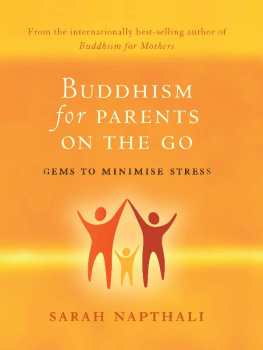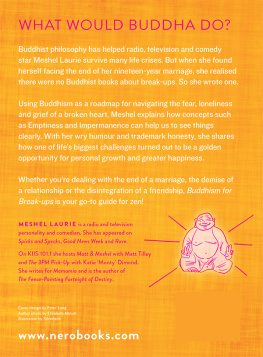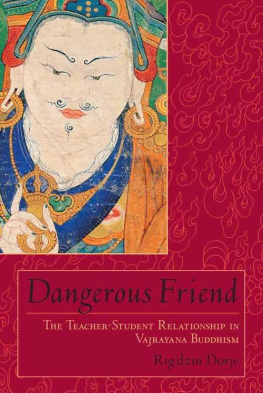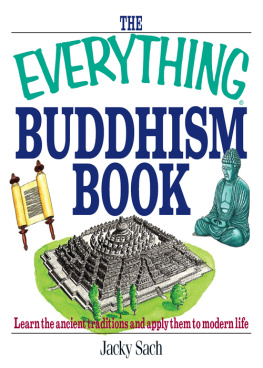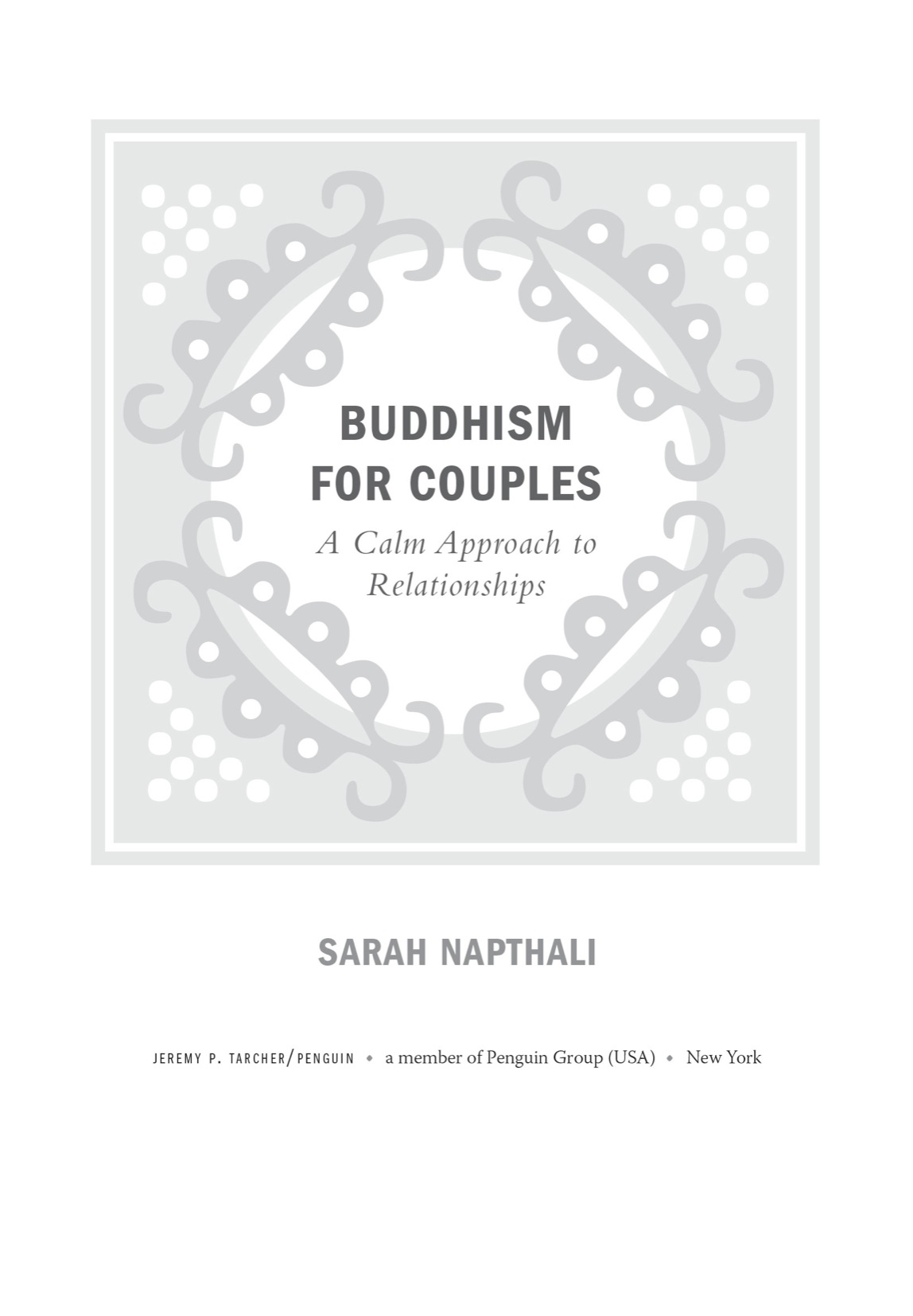JEREMY P. TARCHER/PENGUIN
Penguin supports copyright. Copyright fuels creativity, encourages diverse voices, promotes free speech, and creates a vibrant culture. Thank you for buying an authorized edition of this book and for complying with copyright laws by not reproducing, scanning, or distributing any part of it in any form without permission. You are supporting writers and allowing Penguin to continue to publish books for every reader.
Most Tarcher/Penguin books are available at special quantity discounts for bulk purchase for sales promotions, premiums, fund-raising, and educational needs. Special books or book excerpts also can be created to fit specific needs. For details, write: Special.Markets@penguinrandomhouse.com.
Napthali, Sarah.
Buddhism for couples : a calm approach to relationships / Sarah Napthali.
p. cm.
First published in Australia by Allen & Unwin in 2014.
Includes bibliographical references and index.
1. Man-woman relationshipsReligious aspectsBuddhism. 2. Interpersonal relationsReligious aspectsBuddhism. 3. Interpersonal conflictReligious aspectsBuddhism. 4. Zen Buddhism. I. Title.
INTRODUCTION
Tomek looked up at me from his breakfast, an apologetic expression on his face, and uttered, Oops.
What have you forgotten? I asked, assuming he was about to assign me an errand.
Connie is getting married next week and Im supposed to make a speech at morning tea today wishing her well. Any chance you could write a speech and e-mail it to me?
But Ive never even met Connie! I blurted. What on earth could I say?
Connie was the personal assistant in Tomeks area at work. Tomek works for a large engineering consultancy so the audience for the speech would be twenty or so engineers and draftsmen, almost all male.
It only needs to be a minute or two, Tomek tried to reassure me. Just say a few general things about marriage. I need it by ten oclock this morning if possible.
Fortunately I have the kind of brain that remembers humorous one-liners so, with only a little help from Google, I was able to furnish Tomek with this short, if unoriginal, speech before the ten oclock deadline.
We are gathered here today because our Connie has decided to live in an institution... the institution of marriage, that is.
I highly recommend it... so much so that Ive done it twice!
I also support gay marriage... why should heterosexuals be the only ones to suffer?
To get a womans perspective, I asked my wife for some advice to give to a woman getting married. She said that marriage teaches you all kinds of personal virtues such as tolerance, patience, forgiveness, and lots of other qualities she believes she would never have needed if she hadnt got married.
Yes, there is nothing in the world like the unconditional devotion of a woman.... It is a thing no married man knows anything about.
But on a serious note, we wish you well, Connie, for the years ahead and hope you enjoy your honeymoon in Fiji.
I called Tomek that afternoon to find the speech had elicited a few laughs, although he had excluded the line about gay marriage as a little bleak for the occasion.
Striking that task off my to-do list, I could not suppress a quiet voice inside that inquired, Is this all I have to say about marriage? All this cynicism? Is there nothing sacred about this bond?

A few years ago, I met a woman named Beth, who was a long-term Buddhist practitioner and marriage counselor. She told me something about her life with her husband that kept returning to my mind. Every night after we finish eating dinner, we join both hands, look into each others eyes, and tell each other things we feel grateful for in our relationship, taking turns. Really simple things like, I feel grateful that you swept the front porch, or cooked dinner or whatever.
Over the years, I kept recalling this image of Beth and her husband because I found this behavior so strange. I couldnt imagine doing this if I lived to be a million and three. Yet I could also see that her ritual was a very intelligent, rational, and wise act to engage in. It countered one of the most widely cited problems of long-term relationships and one of the leading causes of divorce: lack of mutual appreciation. As a couples counselor, Beth was in a position to know that expressing gratitude, cultivating what some therapists call a climate of appreciation, was one of the best things she could do for her marriage, and, doubtless, her own sense of well-being.
I started to think that maybe, in some way, I was blocked. Perhaps full of blockages. Yet with Buddhist teachings at my fingertips, I knew I had the tools to work on my karmic knots.

For years I hesitated to write a book applying Buddhist teachings to the couple relationship, not least because it might set off my impostor syndrome. Who was I trying to fool that someone like me could write on the topic of adult relationships?
Right now, for example, I have on my desk a cherished book entitled Everyday Blessings, about applying Buddhist teachings in family life. A Zen Buddhist couple, Jon and Myla Kabat-Zinn, wrote the book together.
Imagine! My husband doesnt even read my books, let alone write them with me or even show the slightest interest in Buddhism. I do not hold this against him since such behaviors are simply not in his nature and it would be unrealisticunfair, evenfor me to expect him to change who he fundamentally is. Still, I could never provide readers with a model of Buddhist marriage to match that of the Kabat-Zinns, whose faces smile at me now from the back-cover photo, a picture of compatibility and shared values.
As the months passed, however, it slowly dawned on me that perhaps, as a woman who has found marriage difficult at times, my perspective on marriage and how to improve its quality could be helpful. After all, when it comes to talking about our relationship worries we tend to gravitate toward people who have experienced similar problems to our own. We may hesitate, for example, to take our relationship problems to friends who appear to live in a perpetual state of marital harmony. Equally important, authors who admit to plenty of difficulties are less likely to make others feel inadequate, inferior, or in some way failing.
When I say difficult, I do not mean that my husband torments me. Not intentionally, anyway. My husband is an amazing and impressive man whom I admire a great deal, but he could never be called easygoinghis role at work with almost a hundred people reporting to him requires him to be anything but. Our particular challenge is that we have extremely different tastes, opinions, values, hobbies, and talents. This isnt to say I believe men are from Mars and women are from Venus. We both come from Earth. (Engineers, however, can be another matter.)

